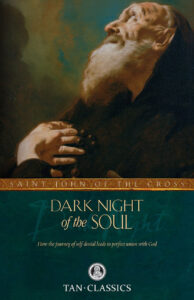St. John of the Cross (1542 – 1591) was a Carmelite priest, mystic, and author. He is also a Doctor of the Church. Both his poetry and his writings on the development of the soul are considered among the greatest on the subject of mystical theology.
By St John of the Cross
Beginners are not free from many imperfections, in the matter of the two other vices, envy and spiritual sloth. Many of them are often vexed because of other men’s goodness. They are sensibly afflicted when others outstrip them on the spiritual road, and will not endure to hear them praised. They become fretful over other men’s virtues, and are sometimes unable to refrain from contradiction when they are commended; they depreciate them as much as they can, looking on them with an evil eye, and feel it acutely because they themselves are not thought so well of, for they wish to be preferred above all others. This is most opposed to that charity of which St. Paul says, it “rejoiceth with the truth.” If charity admits of envy at all, it is a holy envy that makes us grieve that we have not the virtues that others have; but still rejoicing that they have them, and glad that others outstrip us in the race that they may serve God, we being so full of imperfection ourselves.
As to spiritual sloth, beginners are wont to find their most spiritual occupations irksome, and avoid them as repugnant to their taste, for being so given to sweetness in spiritual things they loathe them when they find none. If they miss once this sweetness in prayer which is their joy—it is expedient that God should deprive them of it in order to try them—they will not resume it; at other times they omit it, or return to it with a bad grace. Thus, under the influence of sloth they neglect the way of perfection—which is the denial of their will and pleasure for God—for the gratification of their own will, which they serve rather than the will of God.
Many of these will have it that God should will that which they will, and are afflicted when they must will that which He wills, reluctantly submitting their own to the divine will. The result is that they frequently imagine that what is not according to their will is also not according to the will of God; and, on the other hand, when they are pleased, they believe that God is pleased. They measure Him by themselves, and not themselves by Him, in direct contradiction to His teaching in the gospel; “He that shall lose his life for My sake, shall find it.” That is, he who shall give up his will for God shall have it, and he who will have it, he shall have it never.
They also find it wearisome to obey when they are commanded to do that which they like not; and because they walk in the way of consolation and spiritual sweetness, they are too weak for the rough trials of perfection. They are like persons delicately nurtured who avoid with heavy hearts all that is hard and rugged, and are offended at the Cross wherein the joys of the spirit consist. The more spiritual the work they have to do, the more irksome do they feel it to be. And because they insist on having their own way and will in spiritual things, they enter on the “strait way that leadeth unto life,” of which Christ speaks, with repugnance and heaviness of heart.
Let this reference to these imperfections among the many under which they labor, who are in the first state of beginners, suffice to show them how necessary it is that God should bring them to the state of proficients, which He effects when He leads them into the dark night of which we shall now speak. In that night He weans them from the breasts of sweetness, in pure aridities and interior darkness, cleanses them from all these imperfections and childish ways, and by ways most different, makes them grow in virtue. For after all the exertions of beginners to mortify themselves in their actions and passions, their success will not be perfect, or even great, until God Himself shall do it for them in the purgation of the dark night. May God be pleased to give me His light, that I may speak profitably of this; for I have great need of it while treating of a night so dark and speaking of a subject so difficult.
This article is taken from a chapter of Dark Night of the Soul by St. John of the Cross, which is available from TAN Books.

No comments:
Post a Comment
Comments are subject to deletion if they are not germane. I have no problem with a bit of colourful language, but blasphemy or depraved profanity will not be allowed. Attacks on the Catholic Faith will not be tolerated. Comments will be deleted that are republican (Yanks! Note the lower case 'r'!), attacks on the legitimacy of Pope Leo XIV as the Vicar of Christ, the legitimacy of the House of Windsor or of the claims of the Elder Line of the House of France, or attacks on the legitimacy of any of the currently ruling Houses of Europe.